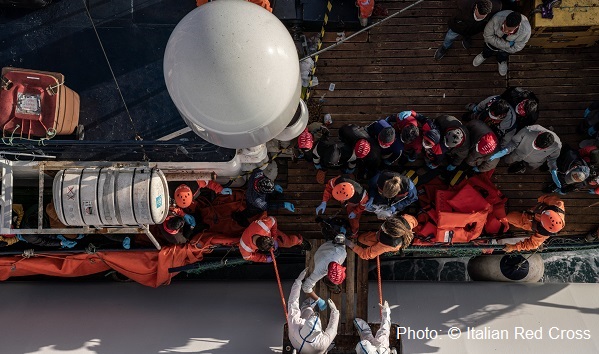By Anaïs Faure Atger, head of the migration unit at the Red Cross EU Office.
This week, the International Federation of Red Cross and Red Crescent Societies (IFRC) published new research conducted by eight National Red Cross and Red Crescent Societies across the globe. Drawing on their experience from the field, the report provides clear evidence of the negative impacts of the COVID-19 pandemic on migrants’ already precarious access to essential services. With widening gaps in state support, humanitarian actors are left with a considerable challenge of providing assistance and protection to those in need – doing so in the context of a shrinking space to exercise their mandates.
While the Global Compact for Safe, Orderly and Regular Migration reaffirmed the responsibility of States to uphold access to essential services for all migrants, in practice humanitarian actors are often forced to step in to provide these services, including to migrants in an irregular situation. This is becoming ever more difficult in the EU context where a political paradox has materialised. On the one hand, EU countries rely heavily on the humanitarian response to minimise some of the negative consequences of increasingly restrictive migration policies. On the other, they are gradually taking steps that reduce the space for humanitarian actors to address the needs of migrants in a principled manner.
A plethora of recent reports highlight how across the EU, organisations and volunteers who assist migrants are increasingly subject to intimidation, harassment, and policing. In many Member States, security-driven migration management strategies aimed at preventing irregular migration are challenging the Red Cross’ ability to access and assist all migrants in need, in line with our mandate.
For instance, the hostile environment towards migrants in northern France is discouraging many from utilising humanitarian services. Daily, French Red Cross staff and volunteers are experiencing how the trust needed to engage with vulnerable groups is threatened by repeated law enforcement operations to dismantle the makeshift camps where humanitarian aid is delivered. In other contexts, National Red Cross Societies are exposed to the risk of criminalisation when they reach out to migrants in an irregular situation. As a result, they have to operate with extreme precaution when assisting this group.
To reduce the possibility of being associated with the activities of smugglers, the Belgian Red Cross now refrains from intervening directly inside camps. People who lack the information or physical strength to actively seek support may thus be falling through the gaps. Furthermore, other forms of support, like driving migrants to a food distribution site, have had to be suspended to avoid accusations of illegally helping people to transit through the territory.
As part of the European Pact on Migration and Asylum the European Commission has issued two guiding documents – the Guidance on the implementation of EU rules on definition and prevention of the facilitation of unauthorised entry, transit and residence and the Commission Recommendation on cooperation among Member States concerning operations carried out by vessels owned or operated by private entities for the purpose of search and rescue activities. These documents are supposedly intended to clarify the importance of not criminalising assistance to migrants and to support Member States in interpreting the EU Facilitators’ package Council Directive 2002/90/EC and 2002/946/JHA: Council framework Decision. However, we see a danger that this clarification could instead result in limiting assistance. Assessing whether an activity meets the definition of humanitarian assistance on a case-by-case basis leaves ample room for different interpretations by Member States. Activities such as providing food, shelter, transport, information, or other services which may not be directly lifesaving, but are critical to ensuring the safety, dignity, and wellbeing of migrants, could be criminalised, or viewed as contributing to irregular migration. Therefore, additional guidelines to enhance legal certainty are urgently needed.
We are also deeply concerned by requests from authorities to collect personal data about the whereabouts of migrants and their family members that our Restoring Family Links (RFL) services have received in several Member States. Responding positively would compromise our neutrality and independence, jeopardising the trust of affected people. At the last International Conference of the Red Cross and Red Crescent of December 2019, governments committed to ensuring that personal data is not requested or used for purposes that are incompatible with the solely humanitarian nature of our work. Strong measures, including firewalls, must be set up to guarantee that this type of data remains within a safe humanitarian space.
Our new position paper on ‘Protecting the humanitarian space to access and support migrants’, sets out five key steps for the EU to take to promote a conducive environment for humanitarian activities with and for migrants, irrespective of their legal status. With humanitarian actors facing growing risks of being instrumentalised in the EU’s effort to reduce irregular arrivals, we call for a more enabling Europe and ask the EU to support the delivery of humanitarian services in a principled manner. In other words, we refuse to jeopardise the trust of the people we serve by being associated with policies that fail to protect the very nature of humanitarian assistance.
Op-ed: ECRE publishes op-eds by commentators with relevant experience and expertise in the field who want to contribute to the debate on refugee rights in Europe. The views expressed are those of the author and does not necessarily reflect ECRE positions.
Photo: (c) Italian Red Cross
This article appeared in the ECRE Weekly Bulletin. You can subscribe to the Weekly Bulletin here.

